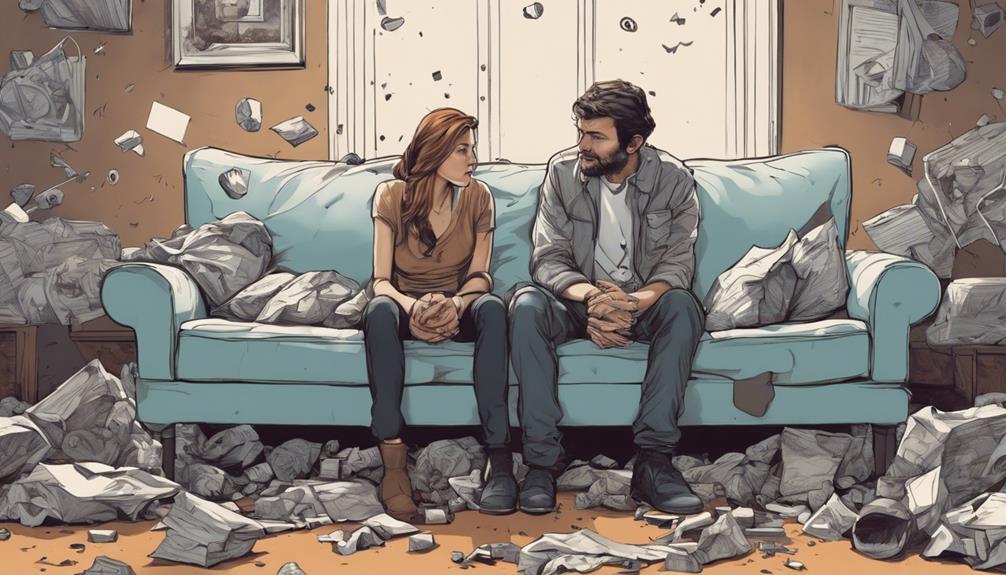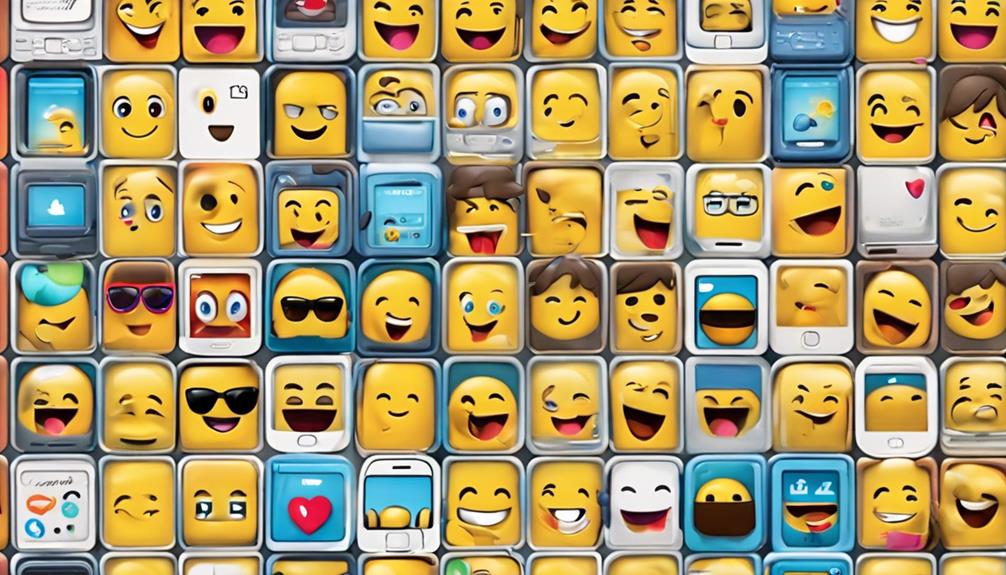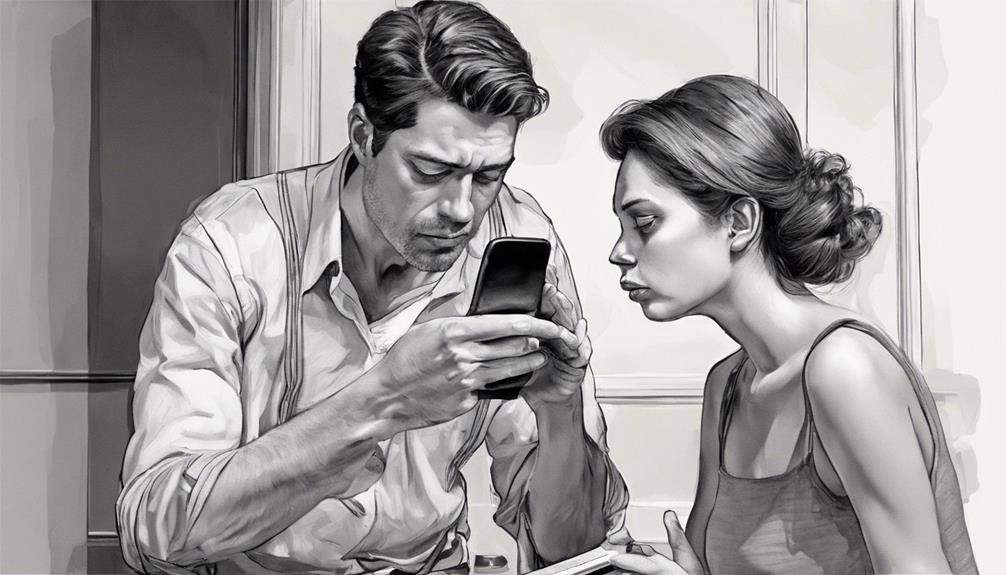As we explore the intricacies of relationships, it resembles unwrapping the layers of an onion to discover the motives behind the actions of our partners.
At times, it may seem as though our boyfriends harbor feelings of animosity towards us, leaving us perplexed and hurt.
Could it be that buried beneath the surface lies a personal struggle he's grappling with, influencing his actions?
Understanding these underlying factors could shed light on why his attitude seems to be veering towards disdain.
Key Takeaways
- Boyfriend's behavior may stem from personal crisis, not hatred.
- Address trust issues and misunderstandings with open communication.
- Create space for healing and set boundaries to navigate emotions.
- Promote positive relationship dynamics through realistic expectations and valuing each other.
Personal Crisis Affecting Behavior
When your boyfriend is going through a personal crisis, such as depression or major life changes, his behavior towards you may seem like he hates you. It can be incredibly challenging to see someone you care about struggling with their emotions, especially when it feels like their negative feelings are directed at you. However, it's crucial to understand that his actions are likely a manifestation of his internal struggles rather than a reflection of his true feelings towards you.
During times of personal crisis, your boyfriend may exhibit behaviors that are out of character, such as anger or withdrawal. It's essential to approach the situation with empathy and patience, recognizing that he may not be intentionally trying to hurt you. By offering your support and helping him address his problems, you can create a safe space for him to work through his emotions and navigate his challenges.
Expectation of Self-Sufficiency

Navigating the expectation of self-sufficiency in a relationship is crucial for fostering personal growth and maintaining a healthy balance between partners. It's essential to find a middle ground where both individuals feel empowered and capable while still supporting each other.
- Embrace Autonomy: Encouraging independence within the relationship can lead to personal growth for both partners. By respecting each other's individuality and allowing space for personal pursuits, you can strengthen your bond without feeling suffocated.
- Avoid Codependent Behaviors: Relying excessively on your partner for emotional or practical needs can strain the relationship. Cultivating self-reliance and seeking support from a variety of sources can prevent imbalanced dynamics and foster a healthier connection.
- Strive for a Healthy Balance: Finding the right mix of partner reliance and self-sufficiency is key. By valuing your own capabilities while also being there for each other, you create a supportive environment that promotes mutual growth and long-lasting harmony in the relationship.
Reaction to a Major Offense
We understand that facing the aftermath of a major offense can be incredibly challenging.
It's important to recognize the hurt and betrayal such actions can cause, leading to unresolved trust issues that may linger.
Misunderstood Actions or Words
Addressing misunderstandings and clarifying intentions is essential in navigating through the aftermath of a major offense, where actions or words may have been misunderstood, leading to feelings of hatred in the relationship. Miscommunication and lack of clarity can exacerbate the situation, causing intense negative emotions to surface.
To address perceived hatred resulting from misunderstood actions or words, it's crucial to engage in open and honest conversations. Here are three key steps that can help in resolving such misunderstandings:
- Listen actively to understand each other's perspectives without judgment.
- Express your feelings and intentions clearly to avoid further misinterpretations.
- Validate each other's emotions and work towards finding common ground for resolution.
Unresolved Trust Issues
Misunderstood actions or words can breed unresolved trust issues, especially in the aftermath of a major offense like cheating or betrayal in a relationship. When trust is shattered, it creates deep emotional wounds that may take time to heal. Rebuilding trust after a major offense necessitates sincere apologies, consistent effort, and patience from both partners. The impact of a major offense can lead to feelings of hurt, betrayal, and resentment, affecting the relationship dynamics and emotional connection. Addressing unresolved trust issues is crucial for repairing the relationship and moving forward positively. By openly acknowledging the pain caused, working on communication, and showing genuine remorse, both individuals can begin the journey towards healing and rebuilding trust.
| Key Points | |
|---|---|
| Sincere apologies | Consistent effort |
| Rebuilding trust | Patience |
| Resentment | Emotional connection |
| Repairing relationship | Unresolved issues |
Emotional Distancing Strategies
In response to a major offense such as cheating or betrayal, emotional distancing can serve as a protective mechanism for individuals to navigate and process their emotions while establishing necessary boundaries.
- Creating Space: Emotional distancing involves taking time and space to heal from the hurt caused by a significant breach of trust. It allows for introspection and self-care.
- Establishing Boundaries: By withdrawing emotionally or exhibiting coldness, individuals set clear boundaries to protect themselves from further pain and regain a sense of control in the relationship.
- Rebuilding Trust: This strategy, though challenging, can pave the way for rebuilding trust over time. It signals a need for understanding and patience to work through the hurt and foster intimacy once again.
Accumulated Resentment Over Small Issues

Feeling unheard and overlooked in a relationship can slowly breed resentment over minor disagreements and disappointments. It's common for small issues to accumulate over time, leading to a sense of frustration and hurt. Your boyfriend may not be intentionally trying to hurt you, but his actions might be causing you to feel undervalued. It's important to address these feelings before they grow into larger problems that could harm the relationship.
| Signs of Accumulated Resentment | How to Address |
|---|---|
| Your boyfriend acts distant and less affectionate | Have an open conversation with your boyfriend to express how his behavior has changed and how you feel. |
| You feel like your needs and opinions aren't being valued | Encourage him to take responsibility for his actions and ask for specific ways to make you feel more appreciated. |
| Family issues or stress may be affecting his behavior | Offer support and understanding, but also communicate the importance of working through problems together. |
Perception of Excessive Neediness
As relationships progress, it's natural for partners to navigate feelings of suffocation due to perceived excessive neediness. It's important to consider how your actions may be impacting your boyfriend's feelings:
- Understand His Perspective: Take the time to empathize with your boyfriend and try to see things from his point of view. Communication is key in addressing any concerns he may have about feeling suffocated.
- Give Him Space: While it's essential to show love and support, it's equally crucial to allow your boyfriend the time and space to pursue his interests and maintain his independence. This can help alleviate any feelings of being overwhelmed.
- Focus on Self-Improvement: Invest time in developing your own hobbies, friendships, and personal growth. Building self-sufficiency can make you feel more fulfilled as an individual and can positively impact your relationship dynamics.
Unrealistic Expectations Placed on You

We've all been there, feeling like we're falling short of expectations that seem impossible to meet. The pressure to constantly excel or fulfill overwhelming emotional demands can take a toll on any relationship.
It's important to remember that setting realistic standards and communicating openly can help navigate these challenges and strengthen the bond with your partner.
High Relationship Standards
Navigating high relationship standards can place undue pressure on both partners, potentially leading to feelings of frustration and inadequacy. Setting unrealistic expectations can create a cycle of dissatisfaction and resentment within the relationship.
Here are three key points to consider:
- Constant Disappointment: Excessively high standards may result in a sense of perpetual letdown, fostering negative emotions.
- Strained Relationship: Placing unrealistic demands on your boyfriend can strain the connection, leading to frustration and resentment.
- Feelings of Inadequacy: High relationship standards can make both partners feel inadequate, contributing to a perceived sense of hatred or disdain.
It's important to communicate openly and work together to establish realistic expectations that promote a healthy and fulfilling relationship.
Overwhelming Emotional Demands
Placing overwhelming emotional demands on your boyfriend can strain the relationship and lead to feelings of being suffocated and overwhelmed. Unrealistic expectations and constantly seeking validation can create emotional burdens and pressure.
Ignoring boundaries and expecting your partner to fulfill all your emotional needs can leave them feeling drained and resentful. It's important to recognize the impact of these actions and strive for a balance in emotional demands.
Taking care of yourself and respecting your boyfriend's boundaries can help prevent these negative feelings. By being mindful of the emotional pressure you may unintentionally be putting on your partner and practicing self-care, you can foster a healthier and more loving relationship.
Natural Inclination Towards Negativity

In relationships, individuals may have a natural tendency towards focusing on negativity, which can influence how your boyfriend perceives and interacts with you. This inclination can create a cloud of negativity that hovers over your relationship, making it challenging to see the positives and leading to misunderstandings and hurt feelings. Here are three ways this natural negativity can manifest:
- Misinterpreting Communication: Your boyfriend might misinterpret your words or actions through a negative lens, assuming the worst intentions behind them. This can lead to unnecessary conflicts and feelings of resentment.
- Ignoring Positive Signs: When someone is inclined towards negativity, they may overlook or downplay the positive aspects of a relationship. Your boyfriend might fail to appreciate your gestures of love and kindness, causing you to feel unappreciated.
- Magnifying Small Issues: Negativity can amplify small issues, blowing them out of proportion and overshadowing the good moments in your relationship. Your boyfriend might get caught up in minor disagreements, leading to a constant state of tension and dissatisfaction.
Frequently Asked Questions
Why Is My Boyfriend Being Mean All of a Sudden?
We noticed your boyfriend's sudden meanness. It's tough when behaviors shift unexpectedly. Understanding his perspective and fostering open communication can help unravel the root of his actions. We're here to support you through this.
Why Do I Find My Boyfriend Annoying All of a Sudden?
We might find our boyfriend annoying due to unmet expectations, changes in behavior, or stress. Addressing these issues with open communication and understanding can help improve our relationship dynamics and foster a deeper connection.
Is It Normal to Feel Like Your Boyfriend Doesn T Love You?
Feeling uncertain about your boyfriend's love is common. Doubts can arise due to various factors. Communication and self-worth are vital. Seeking guidance can provide clarity. Remember, understanding and reassurance are crucial in navigating relationship challenges.
What Does Falling Out of Love Look Like?
Falling out of love can manifest as dwindling affection, increased criticism, lack of intimacy, sudden plan changes, and irritability over small matters. It's crucial to address these signs openly and honestly to navigate relationship challenges effectively.
Could My Boyfriend’s Jealousy be a Sign That He Might Seem to Hate Me?
If your boyfriend’s jealousy is causing issues in your relationship, it’s important to address the root of the problem. Understanding why men get jealous can help you communicate and work through any underlying issues that may be causing tension between you and your partner.
Conclusion
In conclusion, it's important to remember that relationships have their ups and downs, and it's normal to face challenges. While it may seem like your boyfriend hates you, it's crucial to communicate openly, show empathy, and work together to overcome obstacles.
One common objection might be feeling overwhelmed by the effort needed to address these issues, but remember that investing in your relationship can lead to a stronger and more fulfilling connection in the long run.









